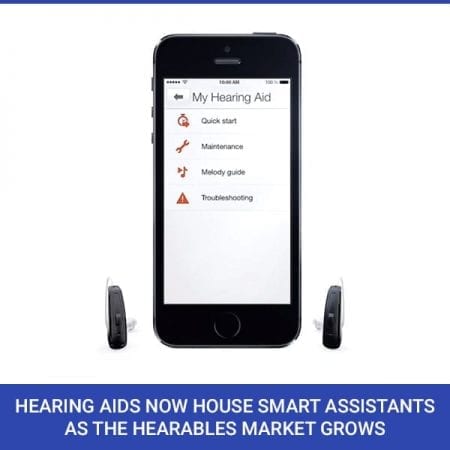 Hearing aids are quietly being transformed as smart assistants begin playing an important role in them. Actually, this is something that dates back to 2013. At this time Bluetooth hearing aids were joined to smartphones, so they were more accessible. Fast forward to 2019 and new features that use companion apps (e.g. smart assistant access) are now being introduced. Today, approximately three in five major hearing aid manufacturers have included a personal assistant.
Hearing aids are quietly being transformed as smart assistants begin playing an important role in them. Actually, this is something that dates back to 2013. At this time Bluetooth hearing aids were joined to smartphones, so they were more accessible. Fast forward to 2019 and new features that use companion apps (e.g. smart assistant access) are now being introduced. Today, approximately three in five major hearing aid manufacturers have included a personal assistant.
Who’s Taking the Lead
The first hearing aid to pair up with an AI personal assistant was the Oticon hearing aid from Denmark. This was soon followed by the Resound hearing aid in 2019. At this time, they said they’d start integrating the Siri app into a lot of their hearing aids. Another company who will be introducing this type of a hearing aid is Starkey in partnership with Livio AI hearing aids. This one will come with the Thrive personal assistant and app.
How Machine Learning is Improving the Hearing aid Experience
There are various program settings included with each hearing aid. You can change these to suit the environment that you’re in. This is important because you’ll want to tweak your microphone and amplification settings differently when you’re at home than you would when you’re in a public place. While this is great, the Resound hearing aids and Oticon hearing aids are both taking this a step further. Now they’re including a machine learning element to work along side of their smart assistant. Doing so will help the hearing aid know when you’re in a different environment so it can prompt you to change programs – even making suggestions based on what’s going on around you. It’s only a matter of time before the hearing aid will learn your preferences so it can automatically make this change for you, making everything work together seamlessly so you have a better overall experience.
Using Multiple Assistants to Field General and Local Queries
Hearing aid assistants aren’t trying to become an alternative to Alexa or the Google Assistant. They’re more focused on specifically helping people who are already wearing hearing aids. Their job is to do things like tell you how much battery life remains or what program setting you’re using. These are things that they don’t need to turn to the cloud for help with. Of course, you can still ask them questions that they’ll need the cloud for (e.g. weather). It’s also important to note that the Resound hearing aid is a bit different in that it has Siri answer all your questions regardless of what the question is.
What the Future Holds
We’re still in the early days of voice, especially when it comes to hearing aid assistants. However, people over the age of 55-years-old are the ones who are the most quickly adopting things like smart speakers and voice assistants into their lives. This is why hearing aid manufacturers are taking steps to enhance your experience via machine learning so you’ll have both your general questions and those specifically about your hearing aid answered. In this way, today’s hearing aids are now becoming a part of the hearables market overall. This is why you’ll find specialized features in them that let you access Siri and the Google Assistant. The fact they’re being readily adopted shouldn’t surprise you considering how your ear is an intriguing new access point. This is something that should intrigue you today, so whether you’re interested in getting the Oticon hearing aid or the Resound hearing aid, contact Countryside Hearing Aid Service today. They’ve helped many people enjoy the restoration of their hearing. You should be next.
Picture Credit: ReSound
